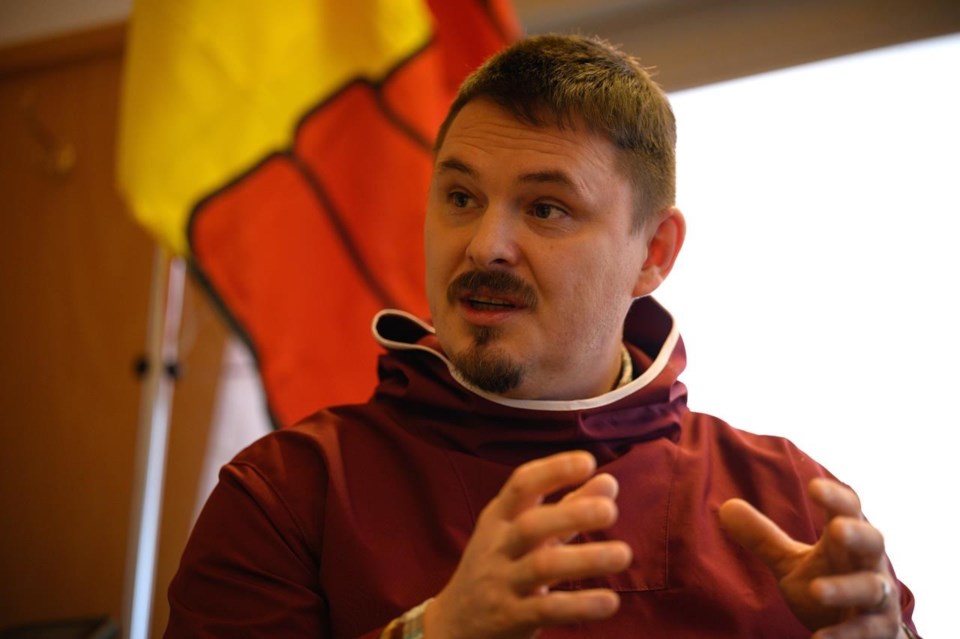IQALUIT, Nunavut — The mayor of Nunavut's capital says the city's housing crisis cannot be solved unless another crisis is dealt with first.
Iqaluit doesn't have access to the water it needs to support a growing population, says Solomon Awa.
People come from all over to live in and visit the hub of the vast territory, whether to find a job or to access services. Statistics Canada reported that the population of the city was about 7,400 in 2021,
Awa has been thinking about what may happen when that number eventually reaches 10,000.
That's too many people for the city's current water reservoir to support, he says.
Awa says finding a way to fix that problem — and allow more housing to be built — is what motivated him to become mayor.
In an interview on Wednesday, he reflected on a piece of advice he got from an elder: "If you don't have worries, you won't fix anything."
"We have to have worries. I'm worried about the housing crisis. I'm worried about the water crisis," he said.
"We need to find the solution."
Driving around the capital after sunset on Wednesday, Awa said "there's not really an empty unit" available in the city.
Open a door, he said, and chances are there will be mattresses on the floor. Awa said he recently heard a figure that some 500 families were waiting for housing units to become available.
From the backseat of a vehicle driven by a staffer, he pointed to a multi-story building.
"That's packed as well," he said. "There's not really an empty unit in Iqaluit."
Overcrowding is also on the mind of Nunavut's premier, and not just when it comes to the capital.
Sitting in his office, P. J. Akeeagok says it's well-known that overcrowded homes lead to health-care problems.
That's a main reason why the territorial government has made building new units its top priority, he said in an interview Wednesday.
Thanks to a new strategy, the premier said the territory was able to ramp up the number of new builds this past summer.
But to keep that momentum going and even increase it, he said they need assistance from Ottawa.
Akeeagok said he's asking the federal government for $250 million.
While he understands $250 million is a significant ask, Nunavut residents "deserve the same access" to housing as those elsewhere in Canada, he said.
Prime Minister Justin Trudeau and Housing Minister Sean Fraser have spent the past several months travelling the country, announcing millions in spending for cities to get more homes built at a time when the Liberal government is under immense pressure to increase supply as a way to tackle housing affordability.
Akeeagok said it was "incredible" to see the amount of resources Ottawa has been providing to cities across Canada to tackle the current housing crisis.
The $250 million for his territory would be proportionate to what the federal government has spent elsewhere, he said.
The increased cost of living has been hitting Nunavut hard.
People are feeling the squeeze when it comes to higher food and fuel costs, particularly as households have no alternative but to use diesel, Akeeagok said.
He added he would "absolutely" like to see Ottawa provide the territory with a carve-out when it comes to the carbon price it collects on fuel.
Nunavut's 25 communities have no access to alternative power.
"We just had to increase our fuel prices and that's obviously outside of our control because we have to purchase our fuel at a certain point and then sell it" at cost to residents, Akeeagok said.
The federal Liberals announced last fall they were temporarily pausing the carbon price for home heating oil, an expensive fuel used by a high percentage of homes in Atlantic Canada. But not long after, Trudeau promised there would be no further carve-outs.
This report by The Canadian Press was first published Jan. 17, 2024
Stephanie Taylor, The Canadian Press



